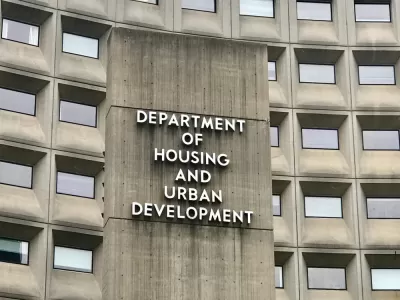The recently funded “Yes In My Back Yard” federal grant program provides support for local and state governments to implement housing policy reforms, but it doesn’t go far enough to undo the exclusionary practices of wealthy communities.

A new article for the Urban Institute provides recommendations for how the U.S. Department of Housing and Urban Development (HUD) can expand on a new federal grant program to increase affordable housing production in traditionally exclusionary communities.
First, the author of the post, Yonah Freemark, connects the country’s current housing shortage, in part, to the exclusionary practices of the nation’s wealthiest cities and towns, citing research published in January by Luiza Godniez-Puig and Gabriella Garriga, along with Freemark.
“These communities often dissuade or ban the development of affordable housing projects, such as those funded through the Low-Income Housing Tax Credit Program, within their boundaries, which creates higher rates of racial and class-based segregation,” explains Freemark.
Freemark cites clear evidence about the prevalence of housing segregation in the United States, and the direction of the argument is clear: HUD will have to do more than currently enabled to by federal programs in reducing residential segregation.
Freemark cites the weaknesses of the “Yes In My Backyard Act,” an $85 million grant program approved by Congress as part of the federal omnibus bill at the end of 2022, as an example of the current limitations of federal programs. For example, the current grant program doesn’t go as far as the proposals of the 2021 YIMBY Act, first proposed in 2019. “[T]he bipartisan 2021 YIMBY Act, would have required recipients of HUD's Community Development Block Grants to track the implementation of several policies that encouraged increasing housing production, such as developing higher-density zoning and reducing minimum lot size,” writes Freemark. “That bill could have led to a more even distribution of affordable housing in regions like NYC, but the bill wasn’t passed.”
Freemark also includes a few specific recommendations for how HUD can increase the effectiveness of the grant program for the task of reducing segregation, with more details on the source article:
- “HUD could support states that target affordable housing subsidies to projects in localities with a low percentage of subsidized housing or that have resisted those units’ construction in the past.”
- “HUD could support MPOs that develop “fair share” policies for distributing federal transportation dollars, which are generally under their purview.”
- “HUD could support pro-affordable-housing localities that agree to reform their zoning rules specifically within neighborhoods with exclusionary zoning.”
FULL STORY: How Federal Policymakers Can Promote Affordable Housing Production in Exclusionary Communities

Trump Administration Could Effectively End Housing Voucher Program
Federal officials are eyeing major cuts to the Section 8 program that helps millions of low-income households pay rent.

Planetizen Federal Action Tracker
A weekly monitor of how Trump’s orders and actions are impacting planners and planning in America.

Ken Jennings Launches Transit Web Series
The Jeopardy champ wants you to ride public transit.

California Invests Additional $5M in Electric School Buses
The state wants to electrify all of its school bus fleets by 2035.

Austin Launches $2M Homelessness Prevention Fund
A new grant program from the city’s Homeless Strategy Office will fund rental assistance and supportive services.

Alabama School Forestry Initiative Brings Trees to Schoolyards
Trees can improve physical and mental health for students and commnity members.
Urban Design for Planners 1: Software Tools
This six-course series explores essential urban design concepts using open source software and equips planners with the tools they need to participate fully in the urban design process.
Planning for Universal Design
Learn the tools for implementing Universal Design in planning regulations.
Ada County Highway District
Clanton & Associates, Inc.
Jessamine County Fiscal Court
Institute for Housing and Urban Development Studies (IHS)
City of Grandview
Harvard GSD Executive Education
Toledo-Lucas County Plan Commissions
Salt Lake City
NYU Wagner Graduate School of Public Service





























